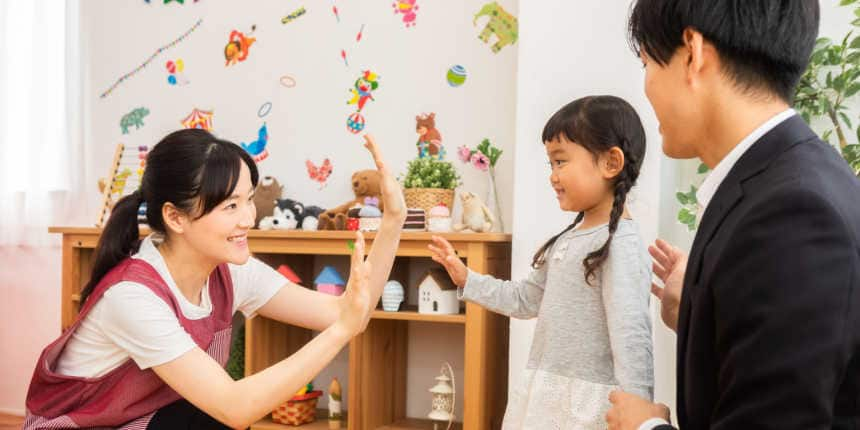Why Is A Healthy Parent-Teacher Relationship Essential For A Child?
The beautiful yet sensitive dyad between the parent and the teacher that was so supportive, encouraging, and motivating for the student in the early years of their schooling, somewhere gets jaded in their teen years and interaction amid this triangle is not something they look forward to. It helps keep a check on them to observe and report concerns, behaviours that need correction and hence a timely intervention can be a completely life-changing experience.

Leaving A Lasting Impression
As a school counselor and a therapist working with so many students, I believe that the trio absolutely holds it all together – the teacher, the student, and the parent. It is a beautiful triad, one that needs to be respected, cherished, and valued. Even today, if asked which “angel teacher” you recall and who was a “devil teacher” that gave you nightmares across your entire school life – you will be able to recall some names and subjects with a complete smile and some with a difficult frown on your face! The same is true of which parent was more encouraging or more critical, and hard to please or someone who accepted you just the way you were! Who came to school for your PTMs and how did you feel when they met and interacted with your teachers? That is the power of a relationship like this! It stays for eternity.
Need For A Healthy Parent-Teacher Relationship
Of course, we know how many parents almost threaten or blackmail their child so the latter falls in line – “Finish your homework or I will tell Lata Miss’”; “Eat your food or I will call the class teacher”; “No more TV now. Remember Miss said only 30 minutes a day?”, etc and I have always made it a point to talk to parents about this during PTMs when they share their inability to discipline and communicate with their own child.
Why would you want to threaten the child with their favourite teacher’s love, fondness, and acceptance of them to make them fall in line? Why does the teacher have to become the monster to scare them? What is it about your own communication that needs to be addressed that the child doesn’t listen and cooperate with you? Why would you ‘discipline’ your child using a teacher's name?
And miraculously, children do fall in line because they love, respect, trust and simply adore their teachers and want them to like them back and so, all is well in their little worlds till they start growing up, experiencing and showcasing behaviours that are tough for them (the students) to understand, express, and articulate.
 The Teacher Does Have The Student’s Best Interests In Mind
The Teacher Does Have The Student’s Best Interests In Mind
Teacher Knows The Child Closely
The teacher works with the student across their best waking hours and knows their potential, providing a valid narrative of what s/he is witness to in the classroom and beyond, of the student with their peers, other teachers, different subjects, social behaviours, skills, other interests, and the school environment in general. The teacher does have the student’s best interests in mind and is always eager to help them, build their self-esteem, confidence, and tap their infinite potential. It also helps checking-in with them when their lives are turbulent and chaotic.
In Best Interests Of The Child
Parents often need help and thus, working on and building a strong relationship with the teacher does go a long way. You need to be honest with your concerns and lay them out just as is and not manipulate the strength of this relationship.
It always helps to get a first-hand storyline of what the challenges are at home for the student. What does the parent really feel? This understanding helps the teacher work with the student on their specific struggles, difficulties (academic, emotional and/or behavioural), conflicts, friendship drama, etc. A protective support system is created that nurtures them whilst at school. Many of the student issues and problems be it academic, physical, emotional, behavioural, or psychological – stem from their immediate home environment and their unmet needs.
A parent recalled with infinite gratitude and fondness about her child's teachers who were instrumental in giving the latter confidence, support, and encouragement and helping her build her self-esteem and her self-image through her turbulent schooling across Classes 8 to 12. She was bullied and completely run down, engaging in self-harm and overwhelmed with suicidal thoughts but these teachers held her togther and made her a piece of Kintsugi.
Making The Best Of This Triad
Here are a few tips for children, parents, and teachers, that shall help them derive the best of this student-parent-teacher triad.
What Children Can Do
- Be honest and put your hand up when you need help.
- Bring the ‘issue’ to the notice of your parent/s and teachers, and ask for timely help and immediate intervention. Doing this does not make you weak, incompetent and small.
- Be it an academic challenge, socially awkward situation, sticky peer conflict, emotional outburst, psychological mayhem, or anything traumatic - T-A-L-K about it and get the right help!
- Take ownership and complete responsibility in assessing your milestones without pressure; with sincerity and integrity.
- Don’t let anyone let you believe and tell you that you are “not good enough” or “capable enough” to accomplish whatever it is that you set your mind to.
- Trust the process of life - you are more than your issues and problems. You are not the reason for your parents marriage not working out, or your teachers inability to nurture you, focus on yourself and your strengths.
 Be Honest And Put Your Hand Up When You Need Help
Be Honest And Put Your Hand Up When You Need Help
How Parents Can Help The Child
- Share your concerns (those about your child) with the teachers with complete honesty. These could be academic or behavioural.
- Talk to teachers about your vulnerabilities and the stark reality of your home environment, your challenges – within the child (from a parent’s perspective), between siblings, if the marriage is shaky, finances, ill health of a parent or a house member, and any other dysfunctionality that may be present.
- Work in tandem with the school and teachers to understand how you can support and complement their work with the child and what your exact deliverable is in this working arrangement.
- Don’t micromanage the child but trust the process of each stakeholder taking ownership and responsibility for the best to happen for the child.
- Maintain regular communication and speak directly to the teacher/s about your concerns and hear them out. Do not engage or encourage frivolous gossip with other parents or put down your child in front of others.
- Insist on getting an anecdotal report card for your child from not only the class teacher but also other subject teachers.
- Please do not compare and run down your child’s self confidence and self belief.
How Teachers Can Help The Child
- Respect, encourage, and motivate the child in the classroom.
- While processing critical feedback, ensure that it is done one on one and not in front of anybody else – no other teacher or student, or even the parent.
- Identify the strengths of the child and work with them. Present them with opportunities to showcase their strong suits and assets, both academic and non-academic – across sports, cultural activities, and leadership roles and hone their budding personalities.
- Work on their self-esteem, confidence, and self-image while normalising many things that may not be easy, smooth, and polished for them during middle and high school.
- Be aware of children’s social skills and overall behaviour at school, not only in your class but also in the immediate environment – like at lunchtime, with peers, and with senior and junior students.
- Do not be partial, judgemental, or biased towards a child whose report card or teacher report precedes them. Take time, observe, and make your own assessment of the child, and have an honest conversation with them about your genuine concerns.
Parent-teacher-child interaction may not be appreciated much by students, especially in their middle and high school years. Yet if its intent is broken down to the student, we can have a great collaborative team working for and with the child for their overall well-being.
Nandini Raman is a Consultant Counselor; Corporate Trainer; and Columnist with a leading English newspaper. She contributes to a successful weekly column on career guidance and choices. With more than fifteen years of experience in the field, Nandini is a guest faculty at many prestigious schools, colleges and training institutions. She is a hands-on parent to two teenagers. Nandini can be reached at www.iamfine.in
Applications for Admissions are open.
As per latest syllabus. Physics formulas, equations, & laws of class 11 & 12th chapters
JEE Main Important Chemistry formulas
Get nowAs per latest syllabus. Chemistry formulas, equations, & laws of class 11 & 12th chapters
JEE Main high scoring chapters and topics
Get nowAs per latest 2024 syllabus. Study 40% syllabus and score upto 100% marks in JEE
JEE Main Important Mathematics Formulas
Get nowAs per latest syllabus. Maths formulas, equations, & theorems of class 11 & 12th chapters
